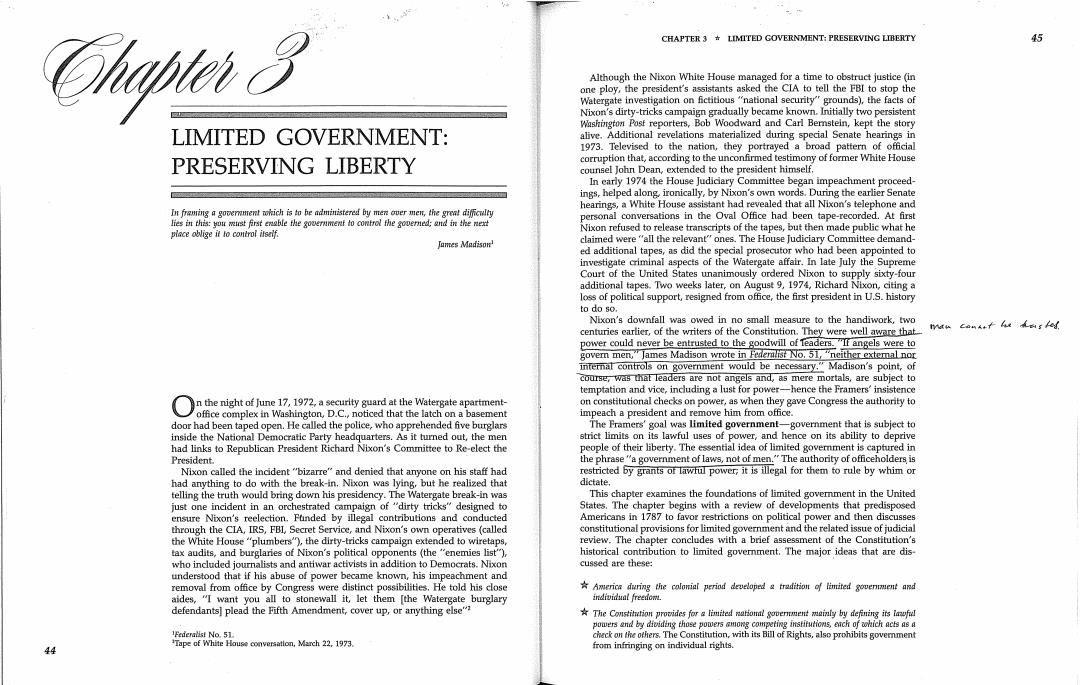
CHAPTER 3 LIMITED GOVERNMENT:PRESERVING LIBERTY 45 Although the Nixon White House managed for a time to obstruct justice(in one ploy,the president's assistants asked the CIA to tell the FBI to stop the Watergate investigation on fictitious "national security"grounds),the facts of Nixon's dirty-tricks campaign gradually became known.Initially two persistent Posf reporters,Bob Woodward and Carl Bemstein,kept the story LIMITED GOVERNMENT: alive.Additional revelations materialized during special Senate hearings in 1973.Televised to the nation,they portrayed a broad pattern of official PRESERVING LIBERTY corruption that,according to the unconfirmed testimony of former White House counsel John Dean,extended to the president himself. In early 1974 the House Judiciary Committee began impeachment proceed- ings,helped along,ironically,by Nixon's own words.During the earlier Senate hearings,a White House assistant had revealed that all Nixon's telephone and In framing a govermmment is to be administered by men over mer,the great difculty personal conversations in the Oval Office had been tape-recorded.At first lies in this:you wetrst first enable the gouernment to comfrol the gouerned:and in the mext Nixon refused to release transcripts of the tapes,but then made public what he place oblige it to control itself. James Madison' claimed were "all the relevant''ones.The House Judiciary Committee demand- ed additional tapes,as did the special prosecutor who had been appointed to investigate criminal aspects of the Watergate affair.In late July the Supreme Court of the United States unanimously ordered Nixon to supply sixty-four additional tapes.Two weeks later,on August 9,1974,Richard Nixon,citing a loss of political support,resigned from office,the first president in U.S.history to do so. Nixon's downfall was owed in no small measure to the handiwork,two comA+t he centuries earlier,of the writers of the Constitution.They were well aware that power could never be entrusted to the goodwill of Teaders."If angels were to govern men,"James Madison wrote in Fedemlist No.51,"neither extemal nor intemat controls on government would be necessary."Madison's point,of course,was that leaders are not angels and,as mere mortals,are subject to temptation and vice,including a lust for power-hence the Framers'insistence 0 n the night of June 17,1972,a security guard at the Watergate apartment- on constitutional checks on power,as when they gave Congress the authority to office complex in Washington,D.C.,noticed that the latch on a basement impeach a president and remove him from office. door had been taped open.He called the police,who apprehended five burglars The Framers'goal was limited government-government that is subject to inside the National Democratic Party headquarters.As it turned out,the men strict limits on its lawful uses of power,and hence on its ability to deprive had links to Republican President Richard Nixon's Committee to Re-elect the people of their liberty.The essential idea of limited govermment is captured in President. the phrase"a government of laws,not of men.The authority of officeholders is Nixon called the incident "bizarre"and denied that anyone on his staff had restricted by grants of lawful power;it is illegal for them to rule by whim or had anything to do with the break-in.Nixon was lying,but he realized that dictate. telling the truth would bring down his presidency.The Watergate break-in was This chapter examines the foundations of limited government in the United just one incident in an orchestrated campaign of "dirty tricks"designed to States.The chapter begins with a review of developments that predisposed ensure Nicon's reelection.Fanded by illegal contributions and conducted Americans in 1787 to favor restrictions on political power and then discusses through the CIA,IRS,FBI,Secret Service,and Nixon's own operatives(called constitutional provisions for limited government and the related issue of judicial the White House"plumbers'"),the dirty-tricks campaign extended to wiretaps, review.The chapter concludes with a brief assessment of the Constitution's tax audits,and burglaries of Nixon's political opponents (the "enemies list"), historical contribution to limited government.The major ideas that are dis- who included journalists and antiwar activists in addition to Democrats.Nixon cussed are these: understood that if his abuse of power became known,his impeachment and removal from office by Congress were distinct possibilities.He told his close ☆Awerica during the colonial period developed&tradition of limited gouenment and aides,"I want you all to stonewall it,let them [the Watergate burglary individual freedom. defendants]plead the Fifth Amendment,cover up,or anything else"? ★The Coustitution provides for a limited national goverrment mainly by defining its lauful powers and by dividing those powers among competing instifutions,ench of acis as a Federalist No.51. check on the others.The Constitutian,with its Bill of Rights,also prohibits govemment Tape of White House conversatlon,March 22,1973. 44 from infringing on individual rights
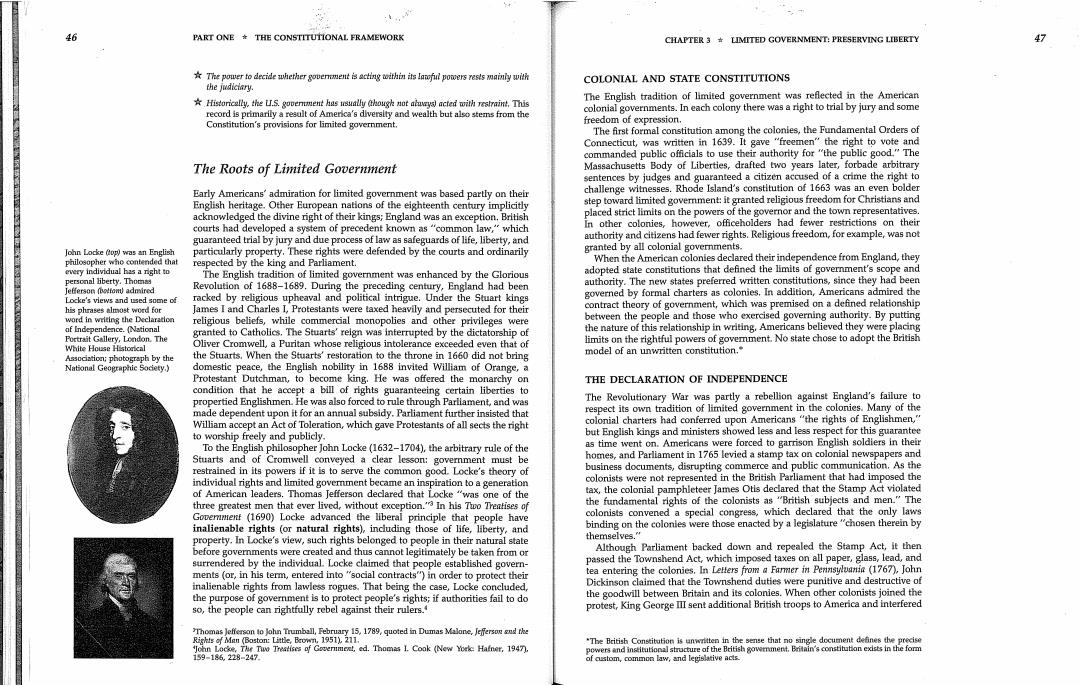
46 PART ONE THE CONSTITUTIONAL FRAMEWORK CHAPTER 3*LIMITED GOVERNMENT:PRESERVING LIBERTY 女The power to decide whether goverment台ingthins时poers7形ss和aywi脐 COLONIAL AND STATE CONSTITUTIONS the judictary. Historically.the U.S.goverment has msualy ahough notayacted with reslraint.This The English tradition of limited government was reflected in the American record is primarily a result of America's diverslty and wealth but also stems from the colonial governments.In each colony there was a right to trial by jury and some Constitution's provis for limited. freedom of expression. The first formal constitution among the colonies,the Fundamental Orders of Connecticut,was written in 1639.It gave "freemen"the right to vote and commanded publie officials to use their authority for"the public good"The The Roots of Limited Government Massachusetts Body of Liberties,drafted two years later,forbade arbitrary sentences by judges and guaranteed a citizen accused of a crime the right to Early Americans'admiration for limited government was based partly on their challenge witnesses.Rhode Island's constitution of 1663 was an even bolder English heritage.Other European nations of the eighteenth century implicitly step toward limited government:it granted religious freedom for Christians and acknowledged the divine right of their kings;England was an exception.British courts had developed a system of precedent known as"common law,"which eemm guaranteed trial by jury and due process of law as safeguards of life,liberty,and authority and citizens had fewer rights.Religious freedom,for example,was not John Locke (op)was an English particularly property.These rights were defended by the courts and ordinarily granted by all colonial governments philosopher who contended that respected by the king and Parliament. When the American colonies declared their independence from England,they every individual has a right to The English tradition of limited government was enhanced by the Glorious adopted state constitutions that defined the limits of government's scope and Revolution of 1688-1689.During the preceding century,England had been authority.The new states preferred written constitutions,since they had been Locke's views and used some of racked by religious upheaval and political intrigue.Under the Stuart kings governed by formal charters as colonies.In addition,Americans admired the his phrases almy t word for ames I and Charles I,Protestants were taxed heavily and persecuted for their contract theory of government,which was premised on a defined relationship word in writing the Declaration religious beliefs,while commercial monopolies and other privileges were between the people and those who exercised governing authority.By putting af Independence.(National the nature of this relationship in writing.Americans believed they were placing Portrait Gallery,London.The granted to Catholies.The Stuarts'reign was interrupted by the dictatorship of limits on the rightful powers of govemment.No state chose to adopt the British White House Historical Oliver Cromwell,a Puritan whose religious intolerance exceeded even that of the Stuarts.When the Stuarts'restoration to the throne in 1660 did not bring model of an unwritten constitution. domestic peace,the English nobility in 1688 invited William of Orange,a Protestant Dutchman,to become king.He was offered the monarchy on THE DECLARATION OF INDEPENDENCE condition that he accept a bill of rights guaranteeing certain liberties to propertied Englishmen.He was also forced to rule through Parliament,and was The Revolutionary War was partly a rebellion against England's failure to made dependent upon it for an annual subsidy.Parliament further insisted that respect its own tradition of limited government in the colonies.Many of the William accept an Act of Toleration,which gave Protestants of all sects the right colonial charters had conferred upon Americans "the rights of Englishmen," to worship freely and publicly. but English kings and ministers showed less and less respect for this guarantee To the English philosopher John Locke(1632-1704),the arbitrary rule of the as time went on.Americans were forced to garrison English soldiers in their Stuarts and of Cromwell conveyed a clear lesson:government must be homes,and Parliament in 1765 levied a stamp tax on colonial newspapers and restrained in its powers if it is to serve the common good.Locke's theory of business documents,disrupting commeroe and public communication.As the individual rights and limited govemment became an inspiration to a generation coloniss were not represented in the British Parliament that had imposed the of American leaders.Thomas Jefferson declared that Locke "was one of the tax,the colonial pamphleteer James Otis declared that the Stamp Act violated three greatest men that ever lived,without exception.'In his Two Trentises of the fundamental rights of the colonists as"British subjects and men."The Govermenf (1690)Locke advanced the liberal principle that people have colonists convened a special congress,which declared that the only laws inalienable rights (or natural rights),including those of life,liberty,and binding on the colonies were those enacted by a legislature "chosen therein by property.In Locke's view,such rights belonged to people in their natural state themselves." before governments were created and thus cannot legitimately be taken from or Although Parliament backed down and repealed the Stamp Act,it then surrendered by the individual.Locke claimed that people established govern- passed the Townshend Act,which imposed taxes on all paper,glass,lead,and ments (or,in his term,entered into"socal contracts")in order to protect their tea entering the colonies.In Letters from a Farmer in Pennsyluanin (1767),John inalienable rights from lawless rogues.That being the case,Locke concluded, Dickinson claimed that the Townshend duties were punitive and destructive of the purpose of government is to protect people's rights;if authorities fail to do the goodwill between Britain and its colonies.When other colonists joined the so,the people can rightfully rebel against their rulers. protest,King George III sent additional British troops to America and interfered Thomas Jefferson to John Trumball,February 15,1789,quoted in Dumas Malone,Jeferson snd the Rights of Man (Boston:Little,Brown,1951)211. The British Constitution is unwritten in the sense that no single document defines the precise 股2ama2aatefemtea6oaitanoana
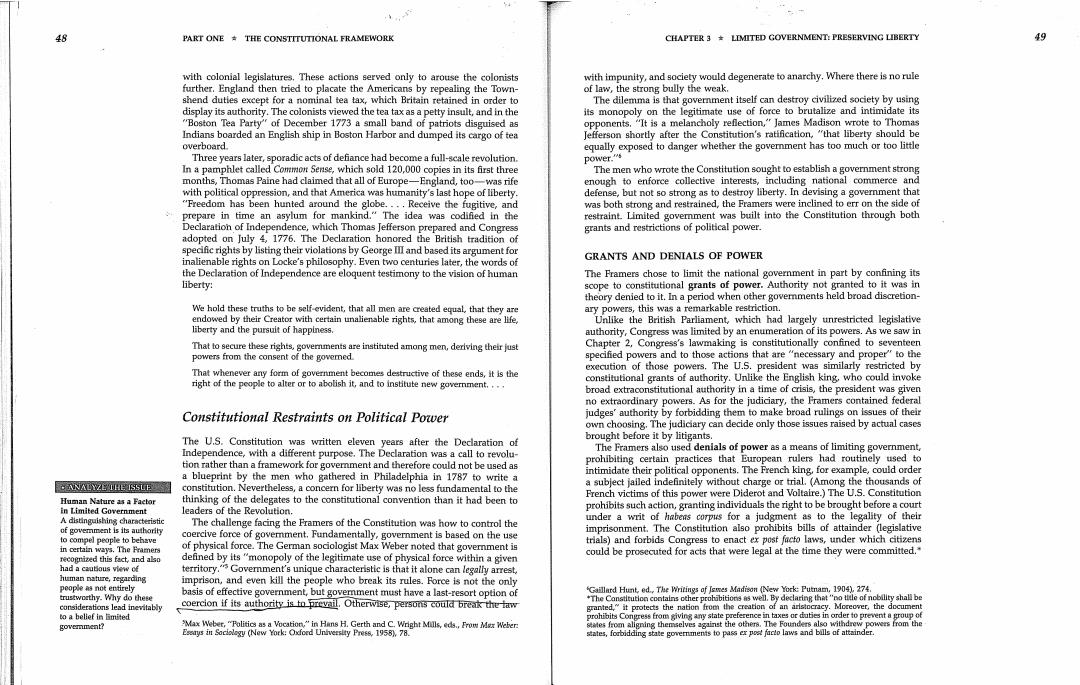
48 PART ONE THE CONSTITUTIONAL FRAMEWORK CHAPTER 3*LIMITED GOVERNMENT:PRESERVING LIBERTY 49 with colonial legislatures.These actions served only to arouse the colonists with impunity,and society would degenerate to anarchy.Where there is no rule further.England then tried to placate the Americans by repealing the Town- of law,the strong bully the weak. shend duties except for a nominal tea tax,which Britain retained in order to The dilemma is that government itself can destroy civilized society by using display its authority.The colonists viewed the tea tax as a petty insult,and in the its monopoly on the legitimate use of force to brutalize and intimidate its "Boston Tea Party"of December 1773 a small band of patriots disguised as opponents."It is a melancholy refection,"James Madison wrote to Thomas Indians boarded an English ship in Boston Harbor and dumped its cargo of tea Jefferson shortly after the Constitution's ratification,"that liberty should be overboard. Three years later,sporadic acts of defiance had become a full-scale revolution. lepododanger whether thevmt has toomuch or toi In a pamphlet called Common Sense,which sold 120,000 copies in its first three The men who wrote the Constitution sought to establish a government strong months,Thomas Paine had claimed that all of Europe-England,too-was rife enough to enforce collective interests,including national commerce and with political oppression,and that America was humanity's last hope of liberty. defense,but not so strong as to destroy liberty.In devising a government that "Freedom has been hunted around the globe....Receive the fugitive,and was both strong and restrained,the Framers were inclined to err on the side of prepare in time an asylum for mankind."The idea was codified in the restraint.Limited goverment was built into the Constitution through both Declaration of Independence,which Thomas Jefferson prepared and Congress grants and restrictions of political power. adopted on July 4,1776.The Declaration honored the British tradition of specific rights by listing their violations by George II and based its argument for inalienable rights on Locke's philosophy.Even two centuries later,the words of GRANTS AND DENIALS OF POWER the Declaration of Independence are eloquent testimony to the vision of human The Framers chose to limit the national government in part by confining its liberty: scope to constitutional grants of power.Authority not granted to it was in theory denied to it.In a period when other govemments held broad discretion- We hold these truths to,that all men are createdequ that they are ary powers,this was a remarkable restriction. endowed by their Creator with certain unalienable rights,that among these are life, Unlike the British Parliament,which had largely unrestricted legislative liberty and the pursuit of happiness. authority,Congress was limited by an enumeration of its powers.As we saw in That to secure these rights,governments are instituted among men,deriving their just Chapter 2,Congress's lawmaking is constitutionally confined to seventeen powers from the consent of the govemed specified powers and to those actions that are "necessary and proper"to the That whenever any form of government becomes destructive of these ends,it is the execution of those powers.The U.S.president was similarly restricted by right of the people to alter or to abolish it,and to institute new government.... constitutional grants of authority.Unlike the English king,who could invoke broad extraconstitutional authority in a time of crisis,the president was given no extraordinary powers.As for the judiciary,the Framers contained federal Constitutional Restraints on Political Power judges'authority by forbidding them to make broad rulings on issues of their own choosing.The judiciary can decide only those issues raised by actual cases The U.S.Constitution was written eleven years after the Declaration of brought before it by litigants. Independence,with a different purpose.The Declaration was a call to revolu- The Framers also used denials of power as a means of limiting government, tion rather than a framework for goverment and therefore could not be used as prohibiting certain practices that European rulers had routinely used to a blueprint by the men who gathered in Philadelphia in 1787 to write a intimidate their political opponents.The French king for example,could order ANALYZE IHE ISSLE constitution.Nevertheless,a concern for liberty was no less fundamental to the a subject jailed indefinitely without charge or trial.(Among the thousands of Human Nature as a Factor thinking of the delegates to the constitutional convention than it had been to French victims of this power were Diderot and Voltaire.)The U.S.Constitution leaders of the Revolution. prohibits such action,granting individuals the right to be brought before a court of gove The challenge facing the Framers of the Constitution was how to control the under a writ of habens corpus for a judgment as to the legality of their its authority coercive force of govemment.Fundamentally,government is based on the use imprisonment.The Constitution also prohibits bills of attainder (legislative to compel people to behave of physical force.The German sociologist Max Weber noted that government is trials)and forbids Congress to enact ex post facto laws,under which citizens in certain ways.The Framers recognized this fact,and also defined by its "monopoly of the legitimate use of physical force within a given could be prosecuted for acts that were legal at the time they were committed." had a cautious view of territory.Government's unique characteristic is that it alone can legally arrest, human nature,regarding imprison,and even kill the people who break its rules.Force is not the only basis of effective government,but govemment must have a last-resort option of 4m.1904274 coercion if its authority is to prevail.Otherwise,persons could break the taw +The C i inevitably m the an the to a belief in Emited o pre govemment? %nheH,GehSetNt Max Wober. the York:Oxfoed University Pr facto laws and bills of attainder
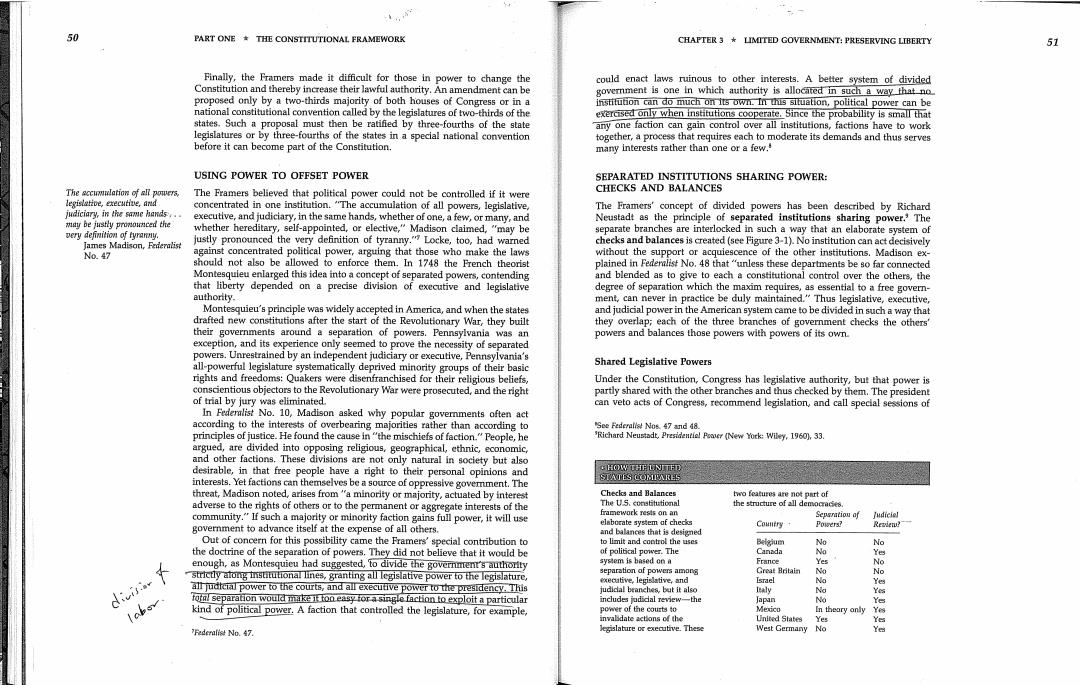
50 PART ONE THE CONSTITUTIONAL FRAMEWORK CHAPTER 3*LIMITED GOVERNMENT:PRESERVING LIBERTY 51 Finally,the Framers made it difficult for those in power to change the could enact laws ruinous to other interests.A better system of divided Constitution and thereby increase their lawful authority.An amendment can be government is one in which authority is allocated in such a way that no proposed only by a two-thirds majority of both houses of Congress or in a institution can do much on its own.In this situation,political power can be national constitutional convention called by the legislatures of two-thirds of the exercised only when institutions cooperate.Since the probability is small that states.Such a proposal must then be ratified by three-fourths of the state any one faction can gain control over all institutions,factions have to work legislatures or by three-fourths of the states in a special national convention together,a process that requires each to moderate its demands and thus serves before it can become part of the Constitution. many interests rather than one or a few. USING POWER TO OFFSET POWER SEPARATED INSTITUTIONS SHARING POWER: The al powers. The Framers believed that political power could not be controlled if it were CHECKS AND BALANCES legislative,executive,and judiciar,i诉thesamehand感s, concentrated in one institution."The accumulation of all powers,legislative, The Framers'concept of divided powers has been described by Richard executive,and judiciary,in the same hands,whether of one,a few,or many,and 机y be justly promownced the Neustadt as the principle of separated institutions sharing power.The pery definition of fyranny. whether hereditary,self-appointed,or elective,"Madison claimed,"may be separate branches are interlocked in such a way that an elaborate system of James Madison,Federalist justly pronounced the very definition of tyranny.Locke,too,had wamed checks and balances is created(see Figure 3-1).No institution can act decisively No.47 against concentrated political power,arguing that those who make the laws without the support or acquiescence of the other institutions.Madison ex- should not also be allowed to enforce them.In 1748 the French theorist plained in Federlist No.48 that "unless these departments be so far connected Montesquieu enlarged this idea into a concept of separated powers,contending and blended as to give to each a constitutional control over the others,the that liberty depended on a precise division of executive and legislative degree of separation which the maxim requires,as essential to a free govern- authority. ment,can never in practice be duly maintained."Thus legislative,executive Montesquieu's principle was widely accepted in America,and when the states and judicial power in the American system came to be divided in such a way that drafted new constitutions after the start of the Revolutionary War,they built they overlap;each of the three branches of government checks the others' their governments around a separation of powers.Pennsylvania was an powers and balances those powers with powers of its own. exception,and its experience only seemed to prove the necessity of separated powers.Unrestrained by an independent judiciary or executive,Pennsylvania's all-powerful legislature systematically deprived minority groups of their basic Shared Legislative Powers rights and freedoms:Quakers were disenfranchised for their religious beliefs, Under the Constitution,Congress has legislative authority,but that power is conscientious objectors to the Revolutionary War were prosecuted,and the right partly shared with the other branches and thus checked by them.The president of trial by jury was eliminated. can veto acts of Congress,recommend legislation,and call special sessions of In Fedemlist No.10,Madison asked why popular goverments often act according to the interests of overbearing majorities rather than according to See Federallst Nos 47 and 48. principles of justice.He found the cause in"the mischiefs of faction."People,he argued,are divided into opposing religious,geographical,ethnic,economic, and other factions.These divisions are not only natural in society but also desirable,in that free people have a right to their personal opinions and interests.Yet factions can themselves be a source of oppressive goverment.The STATES道OMRs threat,Madison noted,arises from"a minority or majority,actuated by interest Checks and Balantes adverse to the rights of others or to the permanent or aggregate interests of the The U.S.c community.If such a majority or minority faction gains full power,it will use ework rests on an Sepsration of fudiciel government to advance itself at the expense of all others. elsborate system af checks Country Powers? and balances that is designed Out of concern for this possibility came the Framers'special contribution to to limit and coatrol the uses Beigium 00 No the doctrine of the separation of powers.They did not believe that it would be of polibical pover.The enough,as Montesquieu had suggested,to divide the government's authority system is based on a divisar strictly atong institutional lines,granting all legislative power to the legislature, 海南南 all judteial power to the courts,and all executive power to the presidency.This judidal beanches,but it also Tealy fofal separation would make if too easy for a single faction to exploit a particular 每 includes jadicial review-the Japan No kind of political power.A faction that controlled the legislature,for example, power of the courts to Merco In theary anly invalidate actions of the United States 专 Yes Federalis No.47. egislature or executive.These West Germany
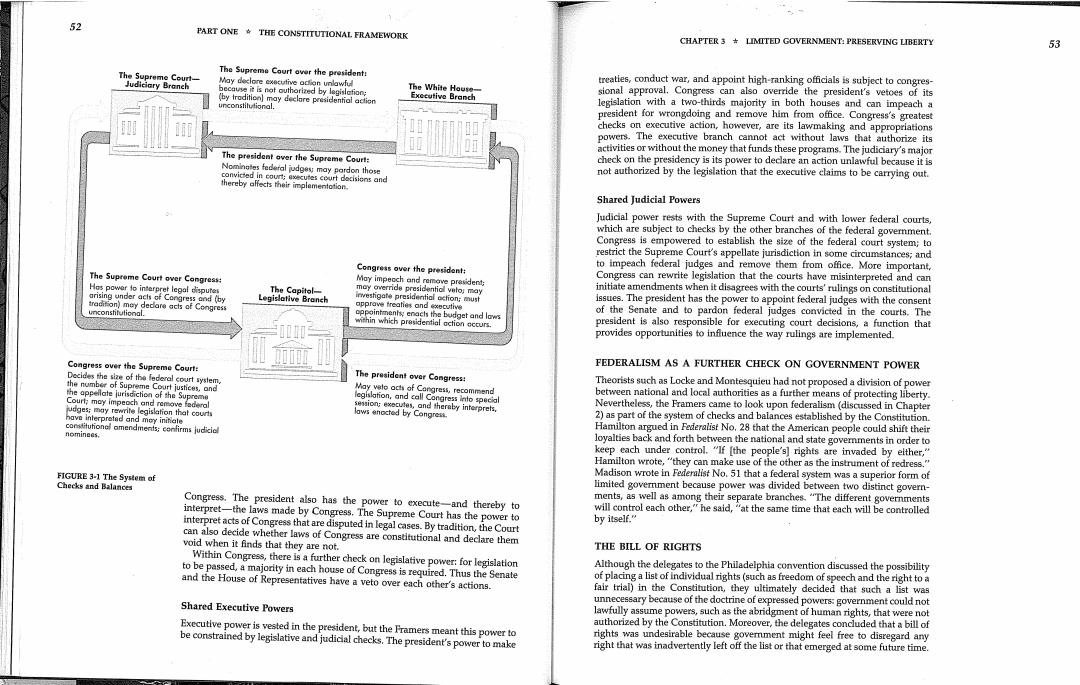
52 PART ONE THE CONSTITUTIONAL FRAMEWORK CHAPTER 3 LIMITED GOVERNMENT:PRESERVING LIBERTY 53 The Supreme Court over the president: treaties,conduct war,and appoint high-ranking officials is subject to congres- is not outhorized by sional approval.Congress can also override the president's vetoes of its may declare presidential acion legislation with a two-thirds majority in both houses and can impeach a president for wrongdoing and remove him from office.Congress's greatest checks on executive action,however,are its lawmaking and appropriations powers.The executive branch cannot act without laws that authorize its The president aver the Supreme Court: activities or without the money that funds these programs.The judiciary's major check on the presidency is its power to declare an action unlawful because it is nca地 not authorized by the legislation that the executive claims to be carrying out. isicns and Shared Judicial Powers Judicial power rests with the Supreme Court and with lower federal courts, which are subject to checks by the other branches of the federal government Congress is empowered to establish the size of the federal court system;to restrict the Supreme Court's appellate jurisdiction in some circumstances;and Congress over the president: to impeach federal judges and remove them from office.More important, The Supreme Court over Congress: Congress can rewrite legislation that the courts have misinterpreted and can Hospwronutes The Capitol- initiate amendments when it disagrees with the courts'rulings on constitutional r acls of Congress and (by s and e issues.The president has the power to appoint federal judges with the consent of the Senate and to pardon federal judges convicted in the courts.The president is also responsible for executing court decisions,a function that provides opportunities to infuence the way rulings are implemented. Congress over the Supreme Court: FEDERALISM AS A FURTHER CHECK ON GOVERNMENT POWER The president over Congress: Theorists such as Locke and Montesquieu had not proposed a division of power between national and local authorities as a further means of protecting liberty. Courl:moy impeoch a Nevertheless,the Framers came to look upon federalism(discussed in Chapter 2)as part of the system of checks and balances established by the Constitution. el amendmers;cenfirms judicicl Hamilton argued in Federalist No.28 that the American people could shift their loyalties back and forth between the national and state governments in order to keep each under control."If [the people's]rights are invaded by either," Hamilton wrote,"they can make use of the other as the instrument of redress." FIGURE 3-1 The Systom of Checks and Balances Madison wrote in Federlist No.51 that a federal system was a superior form of limited goverment because power was divided between two distinct govern- Congress.The president also has the power to execute-and thereby to ments,as well as among their separate branches."The different governments interpret-the laws made by Congress.The Supreme Court has the power to will control each other,"he said,"at the same time that each will be controlled interpret acts of Congress that are disputed in legal cases.By tradition,the Court by itself." can also decide whether laws of Congress are constitutional and declare them void when it finds that they are not. THE BILL OF RIGHTS Within Congress,there is a further check on legislative power:for legislation to be passed,a majority in each house of Congress is required.Thus the Senate Although the delegates to the Philadelphia convention discussed the possibility and the House of Representatives have a veto over each other's actions. of placing a list of individual rights(such as freedom of speech and the right to a fair trial)in the Constitution,they ultimately decided that such a list was Shared Executive Powers unnecessary because of the doctrine of expressed powers:government could not lawfully assume powers,such as the abridgment of human rights,that were not Executive power is vested in the president,but the Framers meant this power to authorized by the Constitution.Moreover,the delegates concluded that a bill of be constrained by legislative and judicial checks.The president's power to make rights was undesirable because government might feel free to disregard any right that was inadvertently left off the list or that emerged at some future time